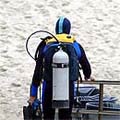« What to do between diving opportunities | Main | Underwater photography »
October 13, 2006
What the PADI and NAUI classes don't teach
I've spent far too many years of my life studying. I don't really regret it and the degrees generally came in handy, but if I had to summarize my overall impression of our educational system, there's one vexing and rather inexplicable aspect that'd rank high on my list: There's always a bunch of really important stuff they never teach you in class. For example, I managed to graduate as an architect without ever being taught how buildings are financed. Duuh... sort of important. Maybe educators view some things as so self-explanatory that it never occurs to them to include them in their curriculums.
I found the same to be true with diving classes. The PADI Open Water course book was certainly comprehensive and very helpful, as was the accompanying DVD. Same for the NAUI "Scuba Diver" coursebook and its DVDs. Both are professionally developed and cover a lot of ground. But there's one thing both overlook, and that is the simple logistics of diving.
What do I mean by "simple logistics"? Well, diving involves a lot of gear. And then there is all the additional stuff you generally keep closeby, like wallets, keys, cellphones and other assorted personal items. By "logistics" I mean what is the best process of making sure you have all your gear, don't exhaust yourself taking along stuff you don't need, where do you put it all as you travel, what do you actually take diving, how do you set up a "base camp," and what do you do with valuables?
Experienced divers will probably look at the above paragraph and go, "Hahaha! What is he talking about? There is nothing to it! Noobs... how stupid can they be?"
Well, yes, I am sure there is nothing to it. Once you have figured it out by trial and error, that is. I also race cars as a hobby. I go drag racing. The first time I went to the track, the logistics seemed overwhelming. There were hundreds of cars in many lanes and I had no clue how it all worked. They all seemed to just do the right thing, moving and staging and racing, and then finding the right place to return to. It was like a giant ant hill -- you have no clue what's going on or how the ants do what they do, but it all functions as smoothly a clockwork. Well, it took me two or three nights at the track and then it all made sense. It all became quite logical and self-explanatory.
But let me explain what, to me, the "ant hill" looks like in diving.
During checkout dives I wondered when to put the wetsuit on. Does one do this right away, or just before diving? And where do you do it? In your car? In the bathroom? In front of people? Behind a bush? And what should you wear underneath? Underwear? A bathing suit? And what do you do with it during surface intervals? Leave it on all the way? Roll it down? And when you're done and it's all wet, what do you bring with you to stow it in so your car doesn't get all wet?
Then the tanks. We took two. Do I shlep both down the hill to the "base camp" (we had two: a couple of picnic tables higher up and then a few blankets close by the water)? Or do I leave one in the car and only take the one I use? And the BC? Do I put that on right away? With the weights? Or do I assemble the gear down by the water and wait til the last minute to put it on? And so on.
Most importantly, what do you bring along and what do you leave? Will there always be a designated person who stays at the base camp and makes sure nothing gets lost or stolen? How does one handle wallets? When diving a lake, it may be okay to simply leave the wallet in the car and lock the car. But in other locations you may need the C-Card and some money, or perhaps even ID. What do you do with it while diving? I wouldn't want to simply leave it on a beach blanket. Neither do I want to leave my camera or my smartphone. And I sure need my reading glasses!
Well, so lock the stuff in the car. Fine, but then you at least need to take the car keys with you. Lose those and you're really in a mess. So do I take them with me while I am diving? Put them in some pocket and hope they don't get lost, or snap them onto some ring or such? Well, if so, le'ts not forget the remote control FOBs that almost all cars have these days. They are certainly not waterproof. And more and more car keys have electronics built into the key's plastic or rubber head itself. Is that waterproof? Probably not. There's always the "valet" key, but not all cars come with one, and I have no clue where mine is.
Can you see now what I mean by "logistics"? What do you take? What do you leave? Where do you keep it? How do you make sure you don't lose important stuff, or find yourself without it when you need it?
See? Some things in life they don't teach you. You just have to find out for yourself.
Posted by conradb212 at October 13, 2006 11:00 PM








